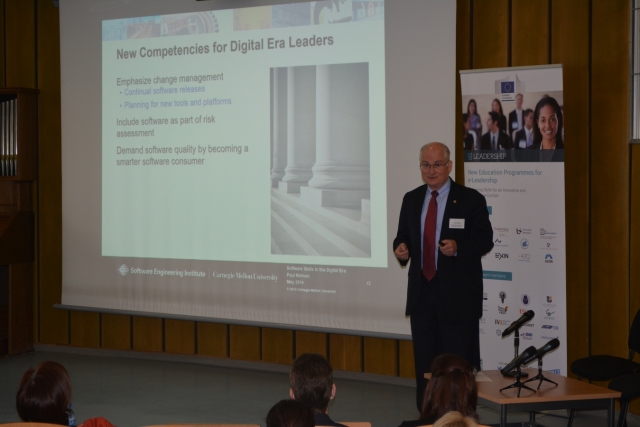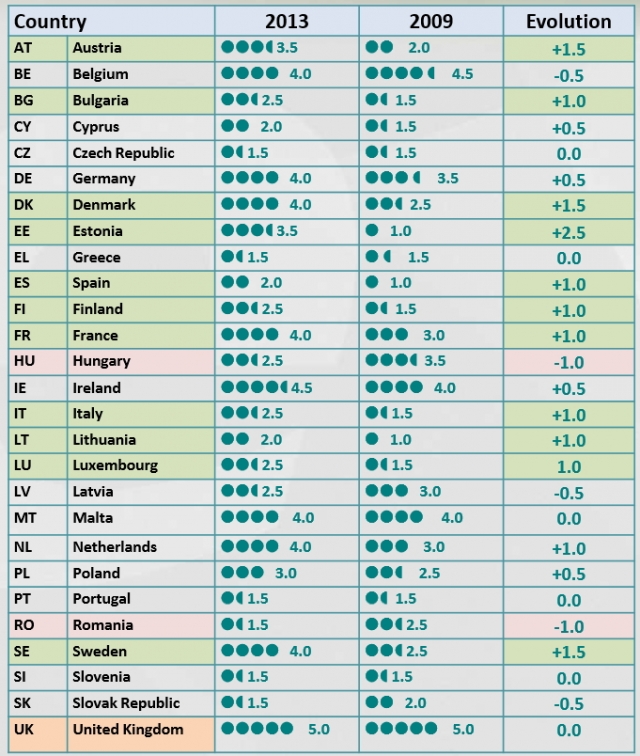Ivan Petkov
The ability of European companies to compete and develop in the early 21st century is increasingly dependent on innovation and the effective use of new information and communication technologies. The strategy for acquisition of e-skills is part of Europe’s agenda relating to digital technologies and measures for the development of company employees towards competitiveness and labour market productivity. Europe wants to create the right conditions for growth and innovation, which, in turn, will create more jobs in the field of information technology. The common policy of the European Union should create a level of competence, skills and knowledge to meet the requirements of the increasingly high international standards in the digital sector. All this can be achieved through proper education and development of staff that meets the requirements of the technology business.
These were the main points of a forum on "New Curriculum for Digital Era Leadership" that took place at New Bulgarian University on 22 May.

Paul Nielsen, head of "Carnegie Mellon University's Software Engineering Institute" and lecturer in "New Curricula for e-Leadership"
It is clear that no profession has remained unaffected by the new technology, whether we realize this or not. Secretaries use computers, doctors, modern equipment, interactive training and tablets are entering schools, taxi drivers use GPS navigation, supermarkets use for their sales integrated storage systems and cash register systems operating with barcode readers, waiters take orders through terminals and they immediately reach the kitchen and sales system. The list is almost endless.
Although these examples are not directly related to a requirement for a high level of computer literacy and e-skills, they indirectly lie behind them. Each of these systems may be specific when applied to businesses that differ in type, structure and nature, but developers who improve, develop and support the systems stand behind all of them. The trend is towards ever-increasing integration of the different systems as well as towards an increasing complexity. The first drones that carry parcels or serve drinks on board aeroplanes are already part of reality. This is not fiction! The fact is that, over the next 20 years, robotic devices will be introduced in many of these occupations and to replace the human factor in them. Of course, the issue provokes a violent debate relating to the ethical and social side of things but that is a separate topic.
It is clear that business has, and will have, a great need for specialists who develop and also discover and introduce new technologies that will directly affect our lives. Growth rates are so high that, by 2015, there will be a widespread shortage of staff with the required competence, namely programmers, testers, system administrators, to serve the expanding digital infrastructure.
Against this background, the educational system is lagging behind, especially in countries like Bulgaria. It is evident that the teaching pattern that most of us know has become irrevocably obsolete and inapplicable over the past two decades. 20 years ago, the educational process needed three things, namely a textbook, teacher and student. The system, which was slowly evolving over the past decades, was sufficient to meet the criteria of the "industrial society" from the 19th century, though transferred to the 20th century. The appearance of the Internet has changed the methods of education due to the free access to every type of information. At the beginning of the 21st century, it was no longer necessary to learn information by heart but to know how to find it. Only a decade later, the fast evolution and the accumulation of vast amounts of information in the World Wide Web created the need for the skill to not only find information, but to recognize and filter reliable information from unreliable data. The skills to classify information came to the fore.
Moreover, the peak of the IT staff trained at formal educational centres was reached around the year 2006, when it was followed by a decline and by keeping IT graduates at certain levels. In 2012, IT professionals occupied only 3.4 % of jobs in Europe, which is equivalent to 7.4 million people. In 2015, there will be 7.45 million IT professionals but the market will need slightly over 8 million. In 2020, the number of available specialists will have increased to 7.95 million and the requirements of the market to 8.85 million. The gap between the two values will be increasing.
Bearing in mind all these data, the future of the digital business remains uncertain. Growth potential looks good, but if no action is taken, many of the vacant jobs will remain unoccupied. Thus, many of the innovations will not be discovered and many projects will not be realized. The shortage of staff will lead to the outsourcing of high-tech activities from which Europe's economy would lose a lot.
It is no coincidence that alternative forms of education, academies, schools, courses that seek to fill the need for IT staff are emerging in addition to the familiar educational institutions. It is inappropriate to wait and rely on a change in the entire educational system, as it is too cumbersome. However, if it starts changing at this very moment, the number of specialists will increase within 10-12 years. This does not mean that the educational system should not develop, it is the basis of the stable economic development of each country. For the moment, however, other options are needed, including turning to specialists, who are not IT graduates, and providing them with an opportunity for retraining.
It is interesting to see the results of similar alternative measures. The e-skills index shows that Bulgaria reported a positive development compared to 2009 and the index rose by 1 percentage point in 2013, from 1.5 to 2.5. By comparison, Greece did not report development in this field and its index remained unchanged during the same period, 1.5. The index value of Britain is 5.0, Ireland 4.5 and other countries stand out with 4.0, Malta being a surprise. The index of Finland and Italy is the same as Bulgaria’s - 2.5. It is noteworthy that in addition to Greece other South European countries such as Spain (2.0) and Portugal (1.5) are at the bottom of the ranking in the company of other countries from the former communist bloc.

The business dynamics is significant and the need for trained IT staff is increasing. Europe is facing the challenge and the ability to train such specialists, which will show whether it will become a centre of innovation in today's world or if it will force the companies to outsource their high-tech activities outside the European Union.